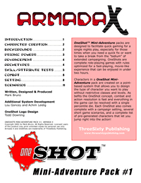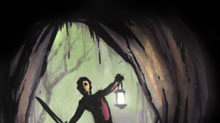by Demian Katz

Armada X
Written by Mark Bruno
Published by ThreeSixty Publishing
20 page PDF
$3
For a couple of years now, I've been enjoying Deep7's 1PG mini-role-playing games. The idea of a cheap, downloadable, fast-playing RPG for quick last-minute games is a good one, and I was glad to see another company, ThreeSixty Publishing, trying the quickie format with Armada X. Intended as the first entry in the company's OneShot series, in Armada X the influence of the 1PGs is easily seen. Author Mark Bruno has worked for Deep7 and, interestingly enough, the OneShot logo was designed by 1PG creator Todd Downing. The close relationship between OneShots and 1PGs is a positive thing, though, because it ensures that OneShots are not merely 1PG rip-offs but rather a complementary variation on a theme. Although similar in basic concept to a 1PG, Armada X is actually quite different in most regards.
The typical 1PG relies entirely on the conventions of a known film genre, features randomized character generation, and has very densely-described, one-page-long scenarios. Armada X, on the other hand, has a briefly-described but original campaign setting, less random character generation, and lengthier, more fleshed-out scenarios. It also features a central game mechanic that is a bit more complex and interesting than the straightforward d6-based system found in the 1PGs. To resolve most actions, players take an attribute value (Body, Mind or Soul) and combine it with a skill value to create a percentage; the attribute value is the tens place and the skill value is the ones place, so, for example, a player with a Soul of 5 and a Bargain of 3 would have a 53% chance of success when trying to make a deal. A roll of 100% is a critical failure, a roll of 1% is a critical success, and it's better to roll under both the tens and the ones places in the target number than to roll under only the tens place; using the example above, a roll of 42% would actually be better than a roll of 38%. Although slightly difficult to explain at first, this mechanic is simple to use and somewhat novel. How do authors keep coming up with new ways of rolling dice in RPGs? I'd have expected ideas to have run out by now.
At this point in the review, I've already gone into great detail about how the system works, yet I haven't told you what the game is about. Perhaps you are irritated by this fact, but I'm merely doing what the game itself does: state the rules first. The first six pages of the twenty-page book are rules-related, and while the presence of androids, spaceships and psionics indicate that this is a science fiction game, the exact details of its nature are not revealed until after the rules are completely explained. I think this is something of a mistake, because I would have engaged with the rules better if I had known what they were helping me to accomplish. The fact that the rules themselves don't really shed any light on the subject of the game also shows another weakness: the system is so generic that it doesn't really meld with the setting well, nor does it encourage players to create characters that are particularly appropriate for the provided scenarios. Some people may enjoy the generic nature of the rules since it means that they can be adapted to other settings, but I would have preferred them to be more closely tailored to the setting at hand since that would have made the GM's job easier (an important goal for a game designed to be played quickly and at short notice) and would ultimately have led to a richer game experience.
Anyway, I guess I can describe the setting now. Armada X is a science fiction game inspired by the American Revolution. Set after the post-WWIV interstellar expansion, it deals with a galaxy in which many planets have been colonized, but the Earth-based government's attempts to support its own interests through ruthless taxation and control have led to a revolution by the colonies. That's about all there is to it; quite a few names and dates are mentioned in the two-page campaign setting section of the booklet, but most of these details are of little importance. The basic premise that history repeats itself is well-used here, and though some of the recycling of Revolutionary War imagery is a little heavy-handed, the setting is workable and potentially exciting. Unfortunately, though, the scenarios that support the setting are rather lacking.
The first scenario, "Blockade Runners," is the better of the two. In it, the players are given a mission to run a supply ship through a Terran blockade, and they ultimately find themselves in over their heads. The scenario is quite linear and a bit predictable, and it relies heavily on the GM's improvisation to make it exciting, but it's certainly workable. Probably its best characteristic is that it includes complete statistics for all of the characters and foes the players come across, preventing combat from becoming as vague as it often does in 1PGs, where limited space rarely allows the inclusion of such things. Its biggest flaw, though, is that it's not nearly as suitable for pick-up-and-play as a 1PG because its text isn't nearly as tight. It's about six pages of dense but lengthy text, and the descriptive text for the players is never separated from the discussions of how to deal with various player actions. If only the good old "boxed-text to read aloud followed by GM-only information" model had been followed, this would have been much easier to use. As it is, it will require more preparation than a one-shot game really should, and it's not quite exciting enough to warrant the effort.
If "Blockade Runners" is a mild disappointment, "Trouble in Paradise" is a disaster. Although the basic ideas behind its plot are more interesting than those found in the previous adventure, the way the story is actually written out makes it too flawed to be playable. The story revolves almost entirely around character interactions that don't make sense. The basic premise is that players crash-land on a prison planet and are rescued by some escaped prisoners living in alien ruins. Somehow or other, though, the PCs end up at odds with their rescuers and in conflict with a prison search party that eventually catches up with them. Unfortunately, it's never very clear why this is supposed to happen. There are hints here and there, but for this adventure to really work, the GM needs explicit information on NPC motivations, and that information simply isn't here, or if it is, it's completely lost in unrelated text, a further testament to the user-unfriendly organization employed by the scenarios. I would never want to run an adventure where I didn't understand what was going on, and I certainly wouldn't want to expend the effort involved in rewriting the thing so it makes sense. This adventure is merely a waste of five pages.
Conclusions
As you can see, this is a product of mixed quality. The game system itself is solid if generic, the setting is interesting but one-dimensional, and the adventures range from mediocre to awful. It's also worth mentioning that there are quite a few spelling and grammar problems, though these may work themselves out over time thanks to the wonders of our current digital age. A quick look at the game's credits suggests the cause of its problems. It was written, designed and produced by a single individual, and no proofreaders or playtesters are credited. When a product is bounced off of an audience, errors are corrected, confusions are clarified, and new perspectives are added. Until that happens, the product is not likely to be as finished as its author may believe. This is not a finished product. I have some sympathy for the author – my own self-publishing experience has taught me that good editors and testers can be hard to find – but my sympathy doesn't change the fact that the game isn't ready for prime time. A complete RPG with two scenarios for $3 should be a great deal, but I would find this purchase hard to justify.
Despite my disappointment with this debut effort, I was enthusiastic about the OneShot concept. The system is quite nice, and the format complements the 1PG line by allowing a little more depth. If more depth could be delivered without so much expense in terms of GM time and effort, I'd be thoroughly pleased. Unfortunately, it doesn't look like Ghost Story, a planned OneShot Mini-Adventure, will be coming out, as ThreeSixty Publishing has shut down as of December 1st. Still, if Mark Bruno brings out similar products through Deep7 or another venue, I'll certainly be in line to have a look.




